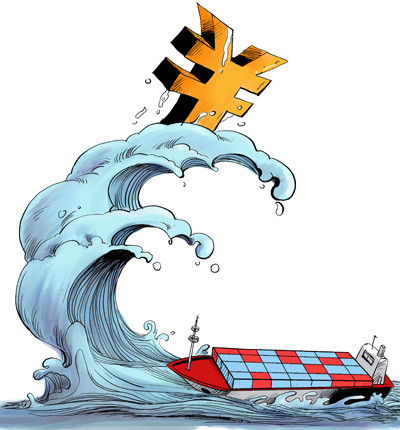Higher yuan hurts
Updated: 2013-06-03 10:46
(bjreview.com.cn)
|
||||||||

The first thing Dong Yuejun does after arriving at the office is to check the latest currency exchanges rates.
"Exchange rate fluctuation of the yuan means uncertain costs. This is the most important thing for export merchants," said Dong, an electric equipment exporter in Ningbo, east China's Zhejiang province.
The yuan's accelerated appreciation began on April 1 this year, strengthening to a record high of 6.1867 against the US dollar on May 24, up from 6.2674. In addition, the yuan has risen 1.6 percent against the dollar since the start of 2013, higher than its 1-percent gain last year.
But the Ministry of Commerce warned that a rising yuan could have a serious impact on Chinese exporters, leaving many to wonder where a rising yuan fits into the overall picture of China's economic growth.
Severe impact
"The more dollars you make, the bigger losses you suffer," said Fu Changguang, a clothing exporter in Hefei, capital of east China's Anhui province, when talking about the recent surge in the value of the yuan. In the past six months, a stronger yuan was the straw that broke the camel's back for his business. "Rising labor and material costs, sluggish demand and intense price competition have made my profit margin paper-thin, and the rising yuan has eaten up the meager profits I've made," Fu said.
"Due to its low profit margin and high reliance on exports, the textile industry became the first to bear the brunt of yuan appreciation," said Tang Shuangshuang, an analyst with Huachuang Securities. According to Tang, a 1-percent appreciation of the yuan will cause profits to erode in the industry by 1-4 percent. Even big companies cannot escape its impact. Lutai Textile Co Ltd, an export-oriented company based in east China's Shandong province, reported its first annual business decline last year since it's being listed on the stock market in 2000. "Exchange rate fluctuations had a negative impact on export revenue," read the company's 2012 annual report.
The textile sector was not the only one hit by a stronger yuan. "My friend who exports enamelware had a profit margin of only 2 percent. New orders decreased by more than 50 percent this year," said Fu.
"The current rising yuan has put many export-oriented Chinese companies under escalating pressure," said Tan Yaling, Director of the China Forex Investment Research Institute.
"The yuan's recent appreciation casts an alarming pall on the profits of China's exporters," said Shen Danyang, a MOFCOM spokesperson. "Many exporters are now afraid of taking more orders because of a lack of confidence in the future of their businesses. And exporters' profits have been squeezed to a very low margin. Many small and medium-sized exporters are scrambling to survive."
The yuan isn't only appreciating against the US dollar. Data show that the yuan has edged up 19 percent against the Japanese yen and 2.6 percent against the euro since the first trading day of the year.
China's exports to Europe in April declined 6.5 percent to $25.9 billion. Trade with some European countries suffered even bigger declines. Germany's imports of Chinese goods fell 7.2 percent and France's by 6.7 percent. Exports to the United States edged down slightly to $28.1 billion.

 Michelle lays roses at site along Berlin Wall
Michelle lays roses at site along Berlin Wall
 Historic space lecture in Tiangong-1 commences
Historic space lecture in Tiangong-1 commences
 'Sopranos' Star James Gandolfini dead at 51
'Sopranos' Star James Gandolfini dead at 51
 UN: Number of refugees hits 18-year high
UN: Number of refugees hits 18-year high
 Slide: Jet exercises from aircraft carrier
Slide: Jet exercises from aircraft carrier
 Talks establish fishery hotline
Talks establish fishery hotline
 Foreign buyers eye Chinese drones
Foreign buyers eye Chinese drones
 UN chief hails China's peacekeepers
UN chief hails China's peacekeepers
Most Viewed
Editor's Picks

|

|

|

|

|

|
Today's Top News
Shenzhou X astronaut gives lecture today
US told to reassess duties on Chinese paper
Chinese seek greater share of satellite market
Russia rejects Obama's nuke cut proposal
US immigration bill sees Senate breakthrough
Brazilian cities revoke fare hikes
Moody's warns on China's local govt debt
Air quality in major cities drops in May
US Weekly

|

|







